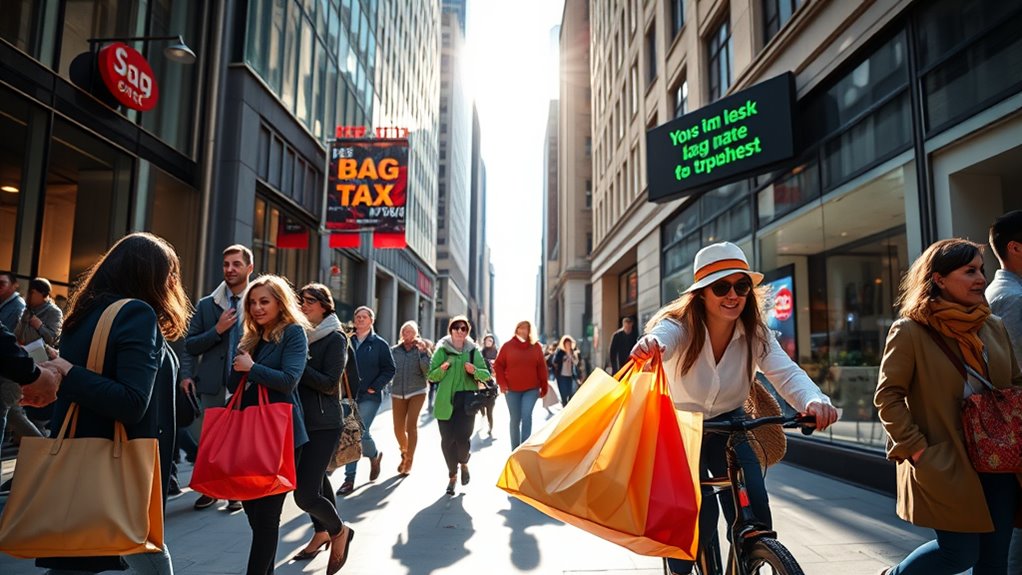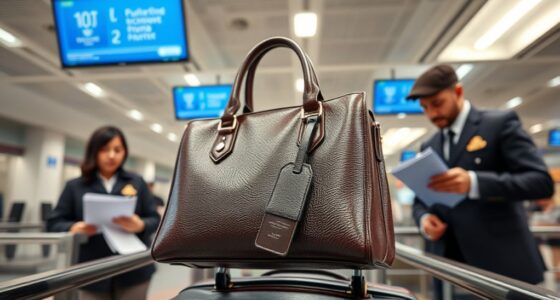Many cities like Dublin, San Francisco, and Seoul now charge a fee for single-use plastic bags to encourage reusable options and reduce waste. These policies often include enforcement measures like inspections and digital tracking, along with public awareness campaigns. Benefits include less plastic pollution and healthier ecosystems. While some face challenges such as retailer resistance, successful programs show lasting environmental and economic gains. Explore how these initiatives work and what makes them successful—there’s more to discover.
Key Takeaways
- Cities like Dublin, San Francisco, and Seoul implement bag taxes to discourage single-use plastic tote consumption.
- Bag taxes promote reusable bags, reducing plastic waste pollution in land and water ecosystems.
- Enforcement includes inspections, digital tracking, and public awareness campaigns to ensure compliance.
- The policies lead to environmental benefits, community engagement, and shifts in consumer and retailer behaviors.
- Alternatives such as incentives, educational programs, and eco-friendly retail practices support sustainable waste management.
Cities Pioneering Bag Tax Initiatives

Several cities around the world have taken the lead in implementing bag tax initiatives to reduce plastic waste. These efforts aim to influence your consumer behavior by encouraging you to bring reusable bags instead of relying on single-use plastics. When a bag tax is introduced, you start to contemplate the environmental impact of your choices, making you think twice before grabbing a plastic bag. Cities like Dublin, San Francisco, and Seoul have successfully used these taxes to promote plastic reduction. As a result, you can expect to see fewer plastic bags in circulation, and you might develop new habits that prioritize sustainability. These pioneering initiatives show how policy can shape your behavior, ultimately helping to cut down on plastic waste globally. Sustainable practices are increasingly being incorporated into urban policies to address environmental challenges.
How Bag Taxes Are Implemented and Enforced

Implementing and enforcing bag taxes typically involves clear regulations set by local governments, which specify when and how the tax applies. Enforcement mechanisms are put in place to guarantee compliance, making it harder for businesses or individuals to ignore the rules. Enforcement strategies often incorporate public awareness campaigns to inform both retailers and consumers about the importance and details of the tax. Compliance monitoring involves regular inspections and tracking sales to identify violations. To effectively enforce the tax, authorities might:
- Conduct surprise inspections at retail stores
- Use digital systems to track transactions
- Impose fines for non-compliance
- Educate merchants about the rules and consequences
- Employ monitoring strategies, rooted in best practices, to ensure consistent enforcement. These strategies often include regular compliance checks and community reporting to uphold accountability. Incorporating transparency and accountability into enforcement efforts helps build public trust and encourages voluntary compliance. Additionally, leveraging technology-based enforcement tools can improve detection and streamline the process. These measures create a sense of accountability and urgency. By actively monitoring compliance, local governments motivate everyone to follow the rules, ensuring the bag tax serves its purpose and discourages unnecessary plastic use.
Environmental Benefits of Bag Tax Policies
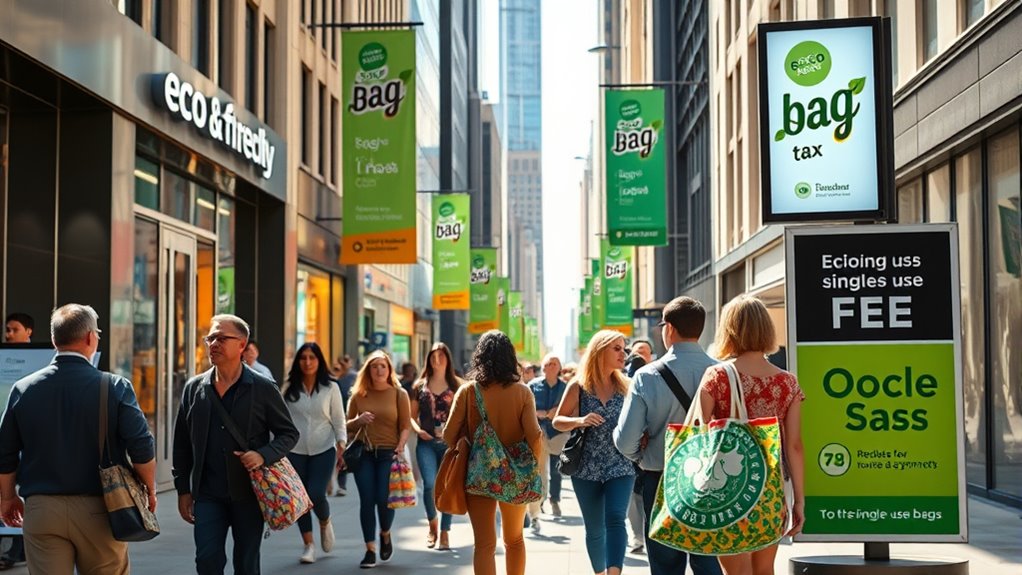
Bag tax policies offer significant environmental benefits by reducing the amount of plastic waste that pollutes land and waterways. When fewer plastic bags are used, there’s less plastic pollution, which harms wildlife and contaminates ecosystems. These policies encourage resource conservation by decreasing the demand for new plastic production, saving energy and raw materials. As a result, fewer bags end up in landfills or oceans, helping to protect habitats and promote cleaner environments. Additionally, promoting public awareness in related initiatives can enhance understanding of environmental issues. Implementing these policies can also lead to a sustainable waste management system that minimizes landfill overflow and promotes recycling efforts. Recognizing the importance of spiritual energy can inspire communities to adopt more mindful and eco-friendly practices that support the planet’s health. Furthermore, understanding the impact of tuning on vehicle performance highlights how small changes can contribute to overall environmental goals.
Economic Impact on Consumers and Retailers
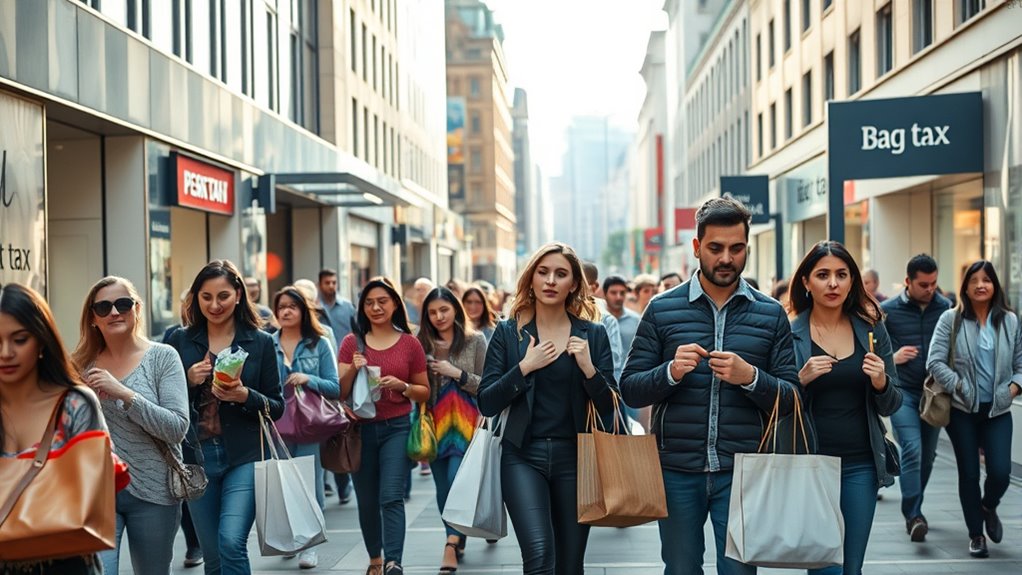
While bag tax policies aim to benefit the environment, they also have immediate economic effects on consumers and retailers. You might experience:
- Increased costs if you forget a reusable bag, impacting your consumer savings.
- Potential changes in shopping habits, possibly reducing retail sales at some stores.
- Opportunities to save money by bringing your own bags, cutting down on extra expenses.
- Retailers adapting by encouraging reusable bag use, which could boost sales of eco-friendly products.
- The rise of home security systems platforms and policies for organizing and promoting eco-conscious shopping options, influencing consumer behavior and retailer strategies. Additionally, some retailers are exploring sustainable packaging options to align with environmental policies and appeal to eco-conscious customers.
- Implementing space-saving solutions in stores to accommodate new bag policies and reduce clutter, which can enhance overall shopping efficiency.
Challenges and Controversies Surrounding Bag Taxes

Despite the environmental benefits, bag taxes face significant challenges and controversies that spark debate among consumers, retailers, and policymakers. Many people resist paying extra, citing inconvenience or skepticism about environmental impact—this is consumer resistance. Additionally, regulatory challenges complicate implementation, as laws vary and enforcement can be inconsistent. Retailers often oppose bag taxes due to fears of losing customers or increased administrative costs. Here’s a quick overview:
| Challenge | Impact | Stakeholders Affected |
|---|---|---|
| Consumer Resistance | Reduced compliance, protests | Consumers, retailers |
| Regulatory Challenges | Difficult policy enforcement | Governments, businesses |
| Retailer Opposition | Financial concerns | Small and large retailers |
| Public Awareness | Varies acceptance levels | Policymakers, advocacy groups |
Furthermore, understanding the environmental impact of single-use bags can influence public opinion and policy decisions. Raising awareness about the long-term ecological effects and the waste management challenges associated with single-use bags may help shift public perception and increase support for bag tax policies. Promoting education about the recycling process can also enhance consumer understanding of how waste is managed and the importance of reducing single-use plastics. Additionally, emphasizing the sustainability benefits of reusable alternatives can motivate more consumers to adopt eco-friendly practices.
Case Studies: Success Stories and Lessons Learned

Several cities around the world have successfully implemented bag tax programs, demonstrating that strategic planning and community engagement can lead to meaningful environmental change. You’ll notice key lessons emerge:
- Retailers adapted quickly, offering reusable bags and promoting eco-friendly options.
- Consumer behavior shifted, with many choosing sustainable alternatives over single-use totes.
- Public education campaigns increased awareness and fostered community pride, often emphasizing the importance of reducing plastic waste to protect marine biodiversity.
- Clear communication about environmental impact motivated ongoing participation. Additionally, integrating sustainable materials into product offerings has further encouraged eco-conscious choices.
- Monitoring and evaluating the programs helped ensure program effectiveness, enabling adjustments that maximize environmental benefits.
These success stories show that combining retail adaptations with targeted messaging encourages lasting change. When you see how communities embrace new habits, it becomes clear that thoughtful policy and active engagement can transform habits, reduce waste, and protect the environment. Your participation plays a pivotal role in these positive outcomes.
Future Trends in Waste Reduction Policies
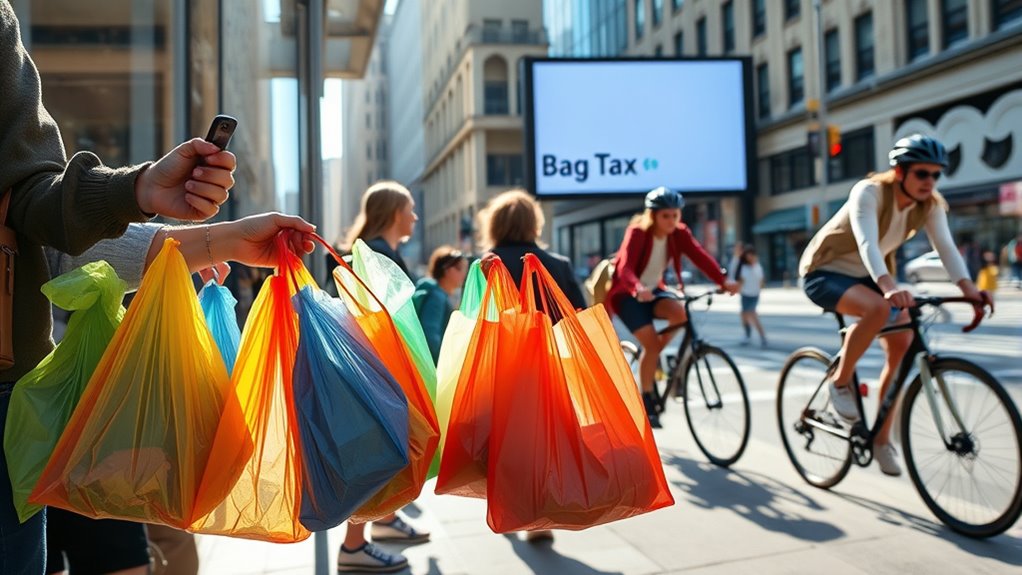
Building on the success stories of bag taxes, future waste reduction policies are increasingly focusing on innovative approaches that leverage technology and community involvement. Recycling innovations are playing a key role, making it easier and more efficient for you to sort and process waste. Smart bins with sensors can track recycling habits and provide real-time feedback, encouraging better participation. Behavioral incentives, such as rewards or discounts, motivate you to reduce single-use items and recycle properly. Cities are also exploring digital platforms that educate and engage residents, fostering a sense of shared responsibility. These strategies aim to create lasting behavioral change, making waste reduction a community effort. As technology advances, your role in sustainable waste management becomes more active and impactful.
Alternatives to Bag Taxes for Promoting Sustainability

Instead of relying solely on bag taxes, communities are exploring a variety of alternative strategies to promote sustainability. These include:
- Encouraging the use of reusable options, reducing waste and fostering environmental responsibility.
- Launching community programs that educate residents on sustainable practices and the benefits of reusable bags.
- Hosting workshops and events that make adopting eco-friendly habits engaging and accessible.
- Partnering with local businesses to offer discounts or incentives for customers who bring their own bags.
These approaches not only reduce reliance on single-use plastics but also build a sense of collective effort. By focusing on education and incentives, communities can inspire lasting change and create a culture of sustainability that benefits everyone.
Frequently Asked Questions
How Do Bag Taxes Influence Overall Waste Management Strategies?
Bag taxes influence your waste management strategies by encouraging behavioral change and reducing environmental impact. When you’re charged for single-use totes, you’re more likely to bring reusable bags, cutting down on landfill waste. This shift helps cities manage waste more sustainably, lessen pollution, and promote eco-friendly habits. Ultimately, bag taxes serve as a practical tool to inspire responsible consumer behavior and enhance overall waste reduction efforts.
Are There Any Health Concerns Linked to Reusable Bag Usage?
Think of reusable bags as your health allies, not threats. While some worry about bacteria transfer, studies show proper cleaning minimizes health implications. For example, a local store once saw a rise in reusable bag use after a ban, reducing waste considerably. Reusable bags benefit the environment and, with regular washing, pose little health risk. Overall, their environmental impact outweighs potential health concerns when maintained properly.
How Do Bag Taxes Affect Small Versus Large Retail Businesses?
You might notice that bag taxes influence consumer behavior, which can create small business challenges and benefits. Small retailers often see more significant impacts because customers may bring their own bags or shop less frequently. Larger businesses usually adapt better due to resources and customer volume. Overall, bag taxes can shift shopping habits, requiring small businesses to innovate while larger stores adjust more easily to changing consumer preferences.
What Are Consumer Perceptions of Bag Taxes Over Time?
Over time, your perception of bag taxes shifts as consumer behavior and public awareness evolve. Initially, you might see them as inconvenient, but as awareness grows, you often understand their environmental benefits. Many consumers become more conscious of waste reduction, leading to increased support. This changing perception encourages more responsible shopping habits, with people increasingly favoring reusable bags, ultimately fostering a positive attitude toward bag taxes and their environmental impact.
Do Bag Taxes Lead to Increased Sales of Alternative Packaging?
You might notice that bag taxes encourage you to switch to alternative packaging options. When these taxes are in place, consumer behavior shifts toward plastic substitution, as people seek cheaper or more convenient options. This often results in increased sales of reusable bags or other eco-friendly packaging. Overall, bag taxes push consumers to choose sustainable alternatives, fostering a shift toward more environmentally conscious shopping habits.
Conclusion
As you consider the bag tax, remember it’s more than just a fee—it’s a call to action, a spark igniting change. By embracing these policies, you help reduce waste, protect the environment, and inspire communities to rethink consumption. Will you join the movement, breaking free from single-use habits? Together, we can turn the tide—one bag at a time—creating a cleaner, greener future, where every choice echoes with purpose and promise.
